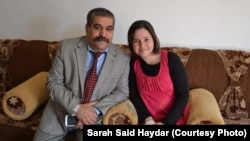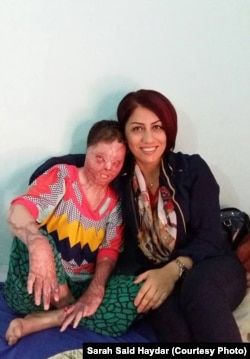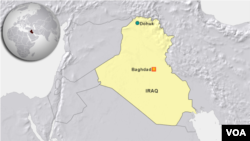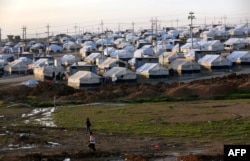Islamic State fighters did scary things to Sarah Said Haydar. Ultimately, they almost scared her to death.
Sixteen-year-old Sarah was among thousands of Yazidis fleeing an Islamic State onslaught in northern Iraq in August 2014.
The teenager and her extended family made it out of her hometown, Tal Qasab, and were heading toward Mount Sinjar when Sarah, her sister and a cousin were caught.
Four Islamic State members threw them in a truck with a dozen other Yazidi girls and women and headed toward Tal Afar, where they were to be offered up as human spoils of war. But the truck broke down.
Beaten, sexually abused
The Islamic State men went straight to work, forcing the captives to recite the phrases that would convert them to Islam. Then they beat them and sexually abused them.
Sarah remembered one fighter in particular, a man with a long red beard.
Yet the Islamic State men proved as incompetent as they were brutal. After night fell, the captives escaped.
They hid in a neighboring village. For the next six days, the four Islamic State fighters searched the area but couldn't find the women. On the seventh day, Sarah, her sister Samira and the others made it to safety.
However, safety was relative.
By the beginning of this year, Sarah was living with her family in Khanke, a camp for the internally displaced in Dohuk.
Signs of depression
However, she was showing signs of depression, possibly post-traumatic stress disorder. She saw a doctor, but she wasn't getting better.
"It's been extremely difficult because the psycho-social support is not there, European pyscho-social support," said Zainab Hawa Bangura, U.N. envoy on sexual violence in conflict.
On Jan. 26, the Islamic State group – or Da'esh, an Arabic acronym – shelled the camp.
Sarah was listening to music on her phone when she heard an explosion; a neighbor's house was hit.
"I thought that Da'esh were coming again and they would torture me," she said.
Sarah felt as though she was falling into an abyss. "I was horrified and my body started shivering," she recalled. "I wanted to kill myself. I couldn't take it anymore."
Sister's help
Her sister Samira, 18, tried to pull her out of her fear. Samira reminded Sarah of all the other girls who had gone through the same ordeal. She wasn't alone, Samira tried to reassure her; Sarah should be thankful she survived.
For not everyone had.
Islamic State militants killed hundreds, possibly thousands of Yazidi men outright. Hundreds more are thought to have died in the chaotic flight from Islamic State danger that began one year ago.
And then there was the more insidious way the Islamic State group could kill.
U.N. envoy Bangura said captured Yazidi girls hanged themselves with their headscarves with such frequency, their Islamic State captors, despite their fundamentalist rules, took away the scarves.
Bangura said she also met one former captive who mixed poison to help 14 girls commit suicide.
In the days after the attack on the Khanke camp, Sarah was reeling, despite her sister's attempts at comfort.
Sarah's father again took her to the doctor, but it didn't help.
"I couldn't get the image of that man out of my mind," Sarah said, referring to the red-bearded captor. "I remembered him touching me, my sister, my cousins and other girls."
She could only think of one thing. "I thought there is no way to survive from them, but put myself on fire."
Sarah went into a room of their makeshift home in Khanke and poured gasoline over her body. Using a lighter, she set herself aflame.
Sarah's mother and Samira rushed into the room, and covered Sarah in blankets and earth to put out the flames. Her mother remembers the fierceness of the fire.
More than half of Sarah's body was burned, including her face and chest.
Sarah survived but spent 75 days in the hospital. She also spent another 10 days in a plastic surgery unit.
International aid
Air Bridge Iraq, a German humanitarian group, helped her travel for treatment to Stuttgart.
Sarah is preparing for a series of skin grafts and other surgery to repair the physical damage. She is also getting extensive counseling.
"ISIS has institutionalized the issue of sexual violence and the brutalization of women," said the U.N.'s Bangura. "They have actually made it a key strategic objective of their campaign. It has become part of the political economy of the war."
It has been a year since Sarah first suffered at the hands of the Islamic State group.
She's in incredible pain, but, speaking by phone from Stuttgart, she is upbeat. She's looking forward to going back to her life before.
Her one wish: to be pretty again.
Margaret Besheer contributed to this report from the United Nations in New York.







